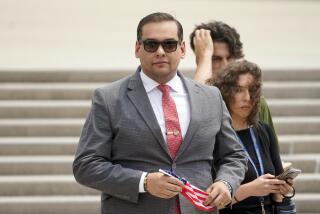Quackenbush Case Brings 2nd Indictment
- Share via
SACRAMENTO — A football coach who operated a camp for troubled children became the second person to be prosecuted in the scandal surrounding former Insurance Commissioner Chuck Quackenbush as a federal grand jury returned an indictment Thursday on mail fraud, conspiracy and obstruction of justice charges.
The grand jury accused Brian K. Thompson, 36, of participating in a scheme to defraud the California Research and Assistance Fund, a charitable foundation created by Quackenbush with money he collected from insurance companies as settlements for their handling of Northridge earthquake claims.
Thompson’s attorney, Peter Kmeto of Sacramento, declined to comment, saying only that his client didn’t engage in any wrongdoing.
On Tuesday, a former deputy and political advisor to Quackenbush, George Grays, was charged with conspiring with Thompson and immediately pleaded guilty to two counts of mail fraud and one count of money laundering.
Federal prosecutors said they would recommend leniency for Grays, who has agreed to testify for the government. He is expected to be the chief witness against Thompson, a former friend.
The indictment alleges that Thompson and Grays engaged in a conspiracy to funnel money from the foundation to a nonprofit organization, the Skillz Athletic Foundation, which was operated by Thompson. As the deputy insurance commissioner, Grays had de facto control of the foundation and its checkbook, the indictment said, although he had handpicked a board of directors to govern it.
Between July 1999 and January 2000, prosecutors said, Grays issued checks to the Skillz Foundation that totaled $263,000. The indictment accused Thompson of then using the money to pay Grays $170,900 in illegal kickbacks.
Thompson spent most of the remainder of the money “for personal, rather than charitable purposes,” according to the indictment filed in U.S. District Court in Sacramento.
Prosecutors allege that Thompson converted funds to his personal use, by making $23,000 in direct transfers to his wife’s bank account, withdrawing $11,000 from the Skillz’s ATM accounts, making $10,150 in checks payable to himself, distributing $5,000 to family members and spending $11,000 for a used Lexus automobile and a new wood dashboard.
Thompson tried to cover up his actions in June 2000 by falsifying corporate records, including two resolutions from a nonexistent board of directors that purported to approve the payments to Grays, according to the indictment. Thompson was charged with obstruction of justice for allegedly “submitting those falsified records to the federal grand jury investigating his activities.”
Federal prosecutors said the charges against Thompson carried a maximum penalty of 50 years in prison and $1.5 million in fines.
Quackenbush, California’s second elected insurance commissioner, was forced to leave office July 10 after the foundation and other foundations he created with insurance company settlements became the subject of a series of legislative hearings.
Quackenbush admitted during the hearings that his department had reached secret settlements with insurance companies that allowed them to avoid penalties for mishandling Northridge earthquake claims by paying into the foundations he created.
Much of the legislative hearings focused on the operation of the foundation, whose assets were used, not only to provide grants to charitable organizations, but also for television spots designed to enhance Quackenbush’s political career.
After Quackenbush’s resignation, law enforcement authorities announced the creation of a special task force that includes the California attorney general’s office, the FBI and the Sacramento district attorney to investigate the activities of his department.
Prosecutors said their investigation is continuing.
More to Read
Sign up for Essential California
The most important California stories and recommendations in your inbox every morning.
You may occasionally receive promotional content from the Los Angeles Times.













